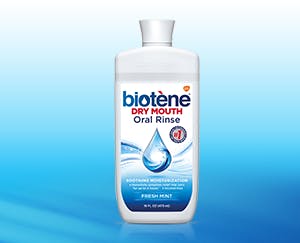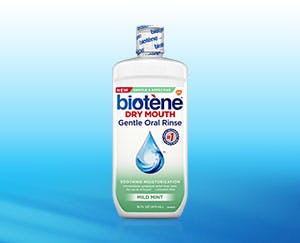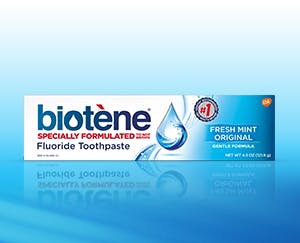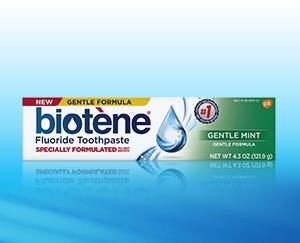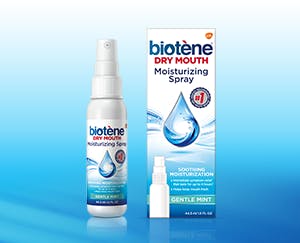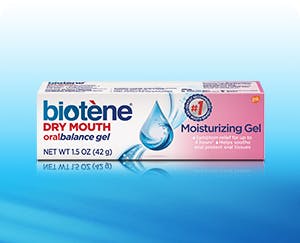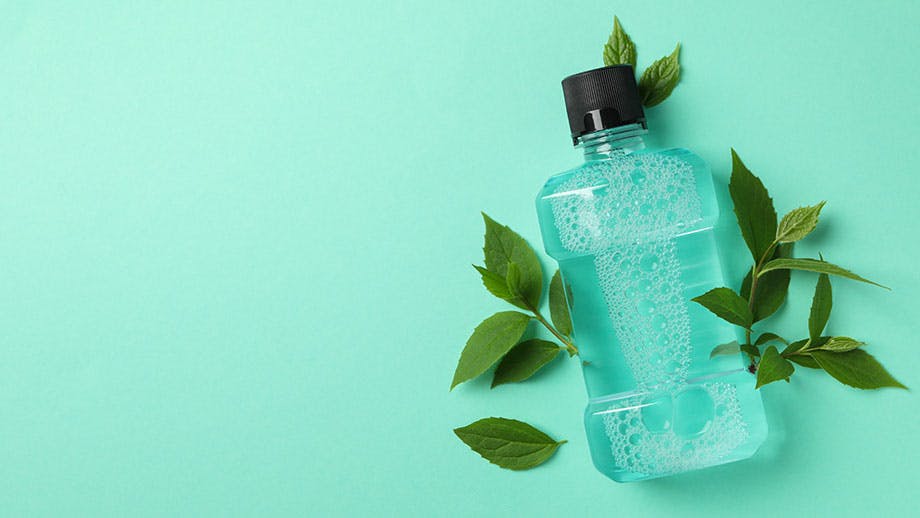
Using mouthwash can help benefit your oral health. Explore our guide on how to use mouthwash today.
Mouthwash 101
You already brush and floss every day. At this point, you’re practically a pro! But you’re not done yet. There is one more step you might want to add to you oral health care routine: mouthwash. A therapeutic mouthwash can help with oral health problems such as plaque, gingivitis, bad breath, and tooth decay.1 And if you’re living with dry mouth, a mouthwash such as Biotène Dry Mouth Oral Rinse may help your dry mouth symptoms. In fact, Biotène Dry Mouth Oral Rinse can provide dry mouth symptom relief that lasts for up to 4 hours.*
Not all mouthwashes are the same. If you’re interested in using a mouthwash, it’s a smart idea to talk to your dentist in order to find a product that suits your needs. Before you do, check out our guide on how to use mouthwash. We’ll explain when to use mouthwash, and provide instructions on how to use Biotène Dry Mouth Oral Rinse. Read on to learn more!
Why Is Mouthwash Important?
Mouthwash is a liquid rinse used before or after brushing your teeth. Mouthwash is a beneficial addition to your oral health routine because it reaches places a toothbrush often can’t.1 Basically, it’s an extra step you can take to help ensure you have a happy, healthy mouth. While mouthwash doesn’t replace brushing and flossing, it can help support your oral health in other ways. You’ll find mouthwashes designed to address a variety of oral health issues, including the following:
- Dry socket*
- Bad breath
- Plaque
- Gingivitis
- Tooth decay
- Whitening
- Dry Mouth1
If you experience any of these oral health problems, mouthwash isn’t a magical cure, but when used in addition to other oral care habits like brushing and flossing, it might be beneficial. It is important to visit your dental professional at least twice a year.2
*Please check with your dentist before using any products after an extraction
What Are the Different Types of Mouthwash?
The American Dental Association divides mouthwash into two different groups: cosmetic and therapeutic.1 Cosmetic mouthwash may be used for surface-level issues. Cosmetic mouthwash helps freshen your breath temporarily, but it won’t treat any underlying oral health issues causing the bad breath.1 Therapeutic mouthwash like Biotène, on the other hand, helps provide relief and comfort for dry mouth symptoms that can cause bad breath.1
When Should You Use Mouthwash?
How and when to use mouthwash depends on the type of mouthwash you’re using. If you’re using a prescription mouthwash, follow the instructions your dentist gave you. For over-the-counter mouthwashes, read the instructions on the label to ensure you’re using the product properly.
Many people use mouthwash at least once or twice a day, although it depends on the type of mouthwash you’re using and your individual oral health needs. Always follow the package directions or directions given by your dental professional.
What Is Biotène Dry Mouth Oral Rinse?
Biotène Dry Mouth Oral Rinse is a mouthwash designed for individuals experiencing dry mouth symptoms. This mouthwash from Biotène helps clean and refresh your mouth while relieving dryness. Specially formulated with a combination of moisturizers and lubricants, this mouthwash provides immediate dry mouth symptom relief for up to four hours.* Find out how to use mouthwash from Biotène below.
How to Use Biotène Dry Mouth Oral Rinse
If you’re looking for dry mouth symptom relief, consider making Biotène Dry Mouth Oral Rinse a part of your oral health routine. Consult with your dental professional prior to using any oral rinse. Learn more about how to use mouthwash, and explore our instructions for Biotène Dry Mouth Oral Rinse:
Adults and children over 12 years of age and older:
Use approximately 15 mL rinse for 30 seconds then spit out. Use up to 5 times per day unless otherwise instructed by a healthcare professional.
Children under 12 years of age:
Do not use unless instructed by a doctor or dentist.
How to Use Mouthwash Most Effectively
In order to use mouthwash in the most effective way possible, the first thing you need to do is choose the right mouthwash for your needs. Bad breath, cavities, gingivitis, dry mouth, and beyond: different conditions will benefit from different types of mouthwash. Check with your dental professional about which mouthwash might be best for you. In order to get all the benefits from mouthwash, be sure to do the following:
- Follow all instructions, especially in regards to product safety.
- Be consistent with usage—don’t give up if you don’t see improvement overnight.
- Continue with other essential oral health habits, such as brushing and flossing.
Thanks for reading our article about how and when to use mouthwash. Learn more about mouthwashes and other products from Biotène today.
*As measured in a 28-day clinical study
Source Citations:
- Mouthwash (Mouthrinse). ADA. https://www.ada.org/resources/research/science-and-research-institute/oral-health-topics/mouthrinse-mouthwash. Accessed 1/22/2021.
- Home Oral Care. ADA. https://www.ada.org/en/member-center/oral-health-topics/home-care. Accessed 9/17/21.


